Katy Huth Jones's Blog, page 25
April 14, 2014
The Goose Principle
 Consider the goose—a seemingly ordinary bird. Many of us have seen a flock of them flying in "V" formation. Have you ever wondered why?
Consider the goose—a seemingly ordinary bird. Many of us have seen a flock of them flying in "V" formation. Have you ever wondered why?Staying together in their tight formation a flock of geese can fly 70% farther than a single goose flying alone! The leader, the point of the “V”, takes the full force of wind resistance, making the going easier for the rest. When the leader tires, another takes its place, then another, so that no one goose has to constantly expend its energy for the sake of the flock.
If one goose becomes injured and cannot keep up with the flock, two other geese will stay with it until it either dies or is well again. The geese do not abandon their own!
We, too, are taught to act like geese. Ecclesiastes 4:9-10 reminds us that “two are better than one . . .for if they fall, the one will lift up his fellow: but woe to him that is alone when he falls; for he has not another to help him up.”
Every organization in which I have been a member (church, homeschool support groups, Boy Scouts, Little League, Daughters of the American Revolution, etc.) is kept alive by a handful who are willing to lead the rest. And just like leading a flock of geese, after a time leaders "burn out" if no one is willing to step up and take a turn leading, in order to allow the point man or woman time to recharge batteries.
Imagine how much more could be accomplished in our organizations if all the members took their turns at leadership, or at least being more actively involved. Just as geese fly in their formation, our groups will keep soaring if we take turns serving one another in leadership roles. Instead of being "takers" who are only concerned about our own desires, we can invest ourselves in the success of the group by becoming "givers" and therefore care about the success of each individual, desiring that no one burns out and falls from the formation.
Unlike a flock of mindless sheep following whichever way the majority drifts, a formation of geese works together with a specific goal or direction in mind, even calling out encouragement to one another while they're flying.
Honk if you plan to be a better goose while flying in your formation….
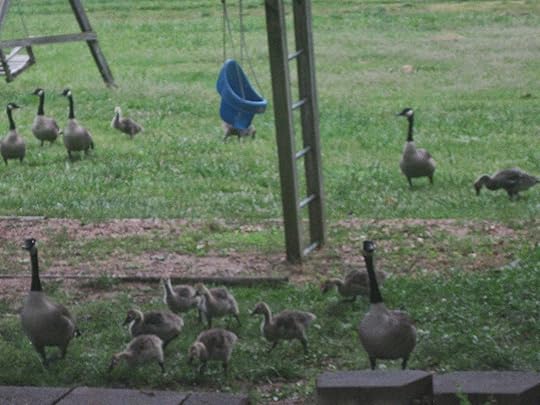 Geese I saw in Branson, MO a few years ago.
Geese I saw in Branson, MO a few years ago.
Published on April 14, 2014 07:08
April 11, 2014
BFF
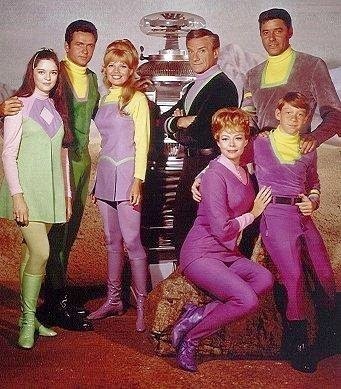 In the summer of 1986 we had an almost-four-year-old son, an almost-six-year-old foster daughter, and a four-month-old son who'd been a preemie (only weighed 8 pounds when he came to us) and wore a heart monitor which apparently was defective because it went off several times in the middle of the night for no reason. It was a challenging summer, to say the least.
In the summer of 1986 we had an almost-four-year-old son, an almost-six-year-old foster daughter, and a four-month-old son who'd been a preemie (only weighed 8 pounds when he came to us) and wore a heart monitor which apparently was defective because it went off several times in the middle of the night for no reason. It was a challenging summer, to say the least.My husband saw how frazzled I was and encouraged me to find something "grown up" to do, just for me, and he would watch the kids. So I signed up for a continuing education creative writing class at Baylor University which met once a week on Thursday evenings.
The first night of class, the instructor had each of us tell the class why we were there and what we liked to write. There were about ten of us, mostly older people, except for one young woman who appeared to be about my age (I was 28 and she was 25). She boldly stood up, said her name was Pamela, and admitted in front of all these strangers that she loved Lost in Space as a child and wanted to write fantasy and science fiction.
That's when I first decided she and I could be friends! I liked Lost in Space too, but I wouldn't have admitted it to strangers. Her spunk drew me in, and her brilliant writing captivated my imagination. Soon we were getting together outside of class to share more of our writing. Not only was she a wonderful writer, she could always see what I meant to write and had great editing skills. Pamela and I were truly "kindred spirits."
About two years later Pamela married, and she and her husband moved about two hours away. It wasn't far, but it was just far enough that we couldn't get together very often. We wrote letters occasionally, and occasionally sent pages or chapters back and forth, but it wasn't working very well.
Then she invited me to come for the weekend, and we began a yearly ritual that has lasted for more than 25 years. Once a year we spend 2-3 days eating Chinese food, visiting every Half Price Books store we can find, walking and laughing and watching crazy TV shows (when we're at her house, since we don't have TV), and of course, reading and commenting on one another's writing. Sometimes we have a LOT to read if we've been prolific over the previous year, but we always manage to get it in, even if we have to stay up all most of the night.
We have had this annual slumber party/writer's fun weekend at her house much more often than she has come here for the simple reason that I have a good sense of direction and she doesn't. The first time she visited our first house across town, I had told her I'd leave the door unlocked in case she arrived before I got home from a class I was teaching. (We live in a small town that used to be safe enough to leave doors unlocked.) When I came home, she met me at the door, grinning sheepishly.
"What?" I asked, since I could tell something was up.
"It's a good thing you have trusting neighbors," she said.
She had read the directions backwards and went inside the house on the other corner, which was also unlocked. After sitting down to wait for me, she started noticing that there was nothing familiar about the place and realized she was in the wrong house! We laughed about that for a long time.
Everyone should have a BFF, but no one could ever have a treasure like Pamela.
 We didn't even let babies stop us from getting together (hers is the smallest one).
We didn't even let babies stop us from getting together (hers is the smallest one).
Published on April 11, 2014 06:04
April 9, 2014
A hard truth for new writers
 In the last couple of years since I've been on Twitter, I've read the first novels of many new acquaintances. The authors' exuberance and excitement is understandable--it IS beyond exciting when your dream comes true and you publish a book!
In the last couple of years since I've been on Twitter, I've read the first novels of many new acquaintances. The authors' exuberance and excitement is understandable--it IS beyond exciting when your dream comes true and you publish a book!However, the books themselves have been a "mixed bag" as far as quality of writing and editing. The stories have been good and worth reading, for the most part, but the execution in terms of plot and writing style (and mistakes in grammar and spelling) have sometimes made me cringe. In a few cases I couldn't finish the story and wanted to throw my Kindle against the wall in frustration.
I am reminded what happened to my first novel (its several drafts were typed on a--gasp--typewriter). The story idea was original. I spent about a year researching the Dogon tribe in West Africa (before the internet--I went to many libraries and ordered books through inter-library loan) in order to make the details authentic. I sent out the manuscript many times by mail in a cardboard box with high hopes each time.
 A Dogon village--photo from Wikipedia.It was never published.
A Dogon village--photo from Wikipedia.It was never published.At the time I was bewildered. After all, I loved the story. I had worked so hard on it! I shelved it and went on to other things. About ten years later I tried to read the novel again and could not get through it. I had (thankfully) developed as a writer enough that reading my first attempt at a novel was PAINFUL. It could NEVER have been published, and thankfully I did not have the option of self-publishing back then, or in my first-novel excitement I might have been tempted to do it.
After I was diagnosed with cancer nine years ago and took a soul-searching look at my overstuffed office (not quite as bad as the picture above but close), I realized I did not want my family to have to go through all those papers once I was gone, so I bagged my two copies of the novel and a stack of research notes and photos about twelve inches thick and threw them away, along with dozens of short stories that were not publishable either. They are rotting in our town's dump even now.
Sometimes I wish I had kept at least one copy of the manuscript. Or the notes. After all, the Dogon culture is fascinating. But all the editors who rejected that story were right to do so and saved me from embarrassing myself with the two-dimensional characters, improbable plot, purple prose, and newbie writing errors.
Yes, it's difficult for writers to be objective about their work. The stories come from the deepest part of our hearts, and even when we try to read them objectively, our emotions can get in the way. If our beta readers are friends and family, they won't want to be honest about mistakes because they (hopefully) love us and want us to succeed.
A good critique group is a great resource and place to get honest feedback. But whether publishing the "traditional" way or self-publishing, a good editor is vitally important to every story in order to make it the best it can be.
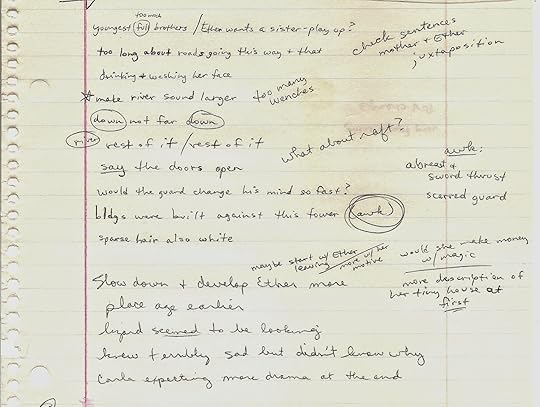 Notes from critique group's honest ripping feedback.
Notes from critique group's honest ripping feedback. First page of ripped manuscript ACCEPTED by MZB for her anthology.
First page of ripped manuscript ACCEPTED by MZB for her anthology.
Published on April 09, 2014 07:21
April 4, 2014
Sober Friday: What are we doing here?
 Don Gilbert, timpanistAt last night's symphony practice I learned that our exemplary timpanist, Mr. Don Gilbert, had passed away in his sleep the night before. He had not been well for the last year (his heart) but it still made me sad that I'll never hear him play again. Until this season I sat beside him (new risers required a rearrangement of the percussion section, and Don and his timpanis moved to the other side of the stage). We used to joke between songs and help one another keep our places during long rests. But more than that, Don was a true professional, always 100% prepared, and a perfectionist with even the most simple notes. He was also humble about his accomplishments. He'd graduated from Eastman School of Music, earned a Master's from Michigan State, and performed at Carnegie Hall. Our symphony was so blessed to have him play with us the last several years, and I don't want him to ever be forgotten.
Don Gilbert, timpanistAt last night's symphony practice I learned that our exemplary timpanist, Mr. Don Gilbert, had passed away in his sleep the night before. He had not been well for the last year (his heart) but it still made me sad that I'll never hear him play again. Until this season I sat beside him (new risers required a rearrangement of the percussion section, and Don and his timpanis moved to the other side of the stage). We used to joke between songs and help one another keep our places during long rests. But more than that, Don was a true professional, always 100% prepared, and a perfectionist with even the most simple notes. He was also humble about his accomplishments. He'd graduated from Eastman School of Music, earned a Master's from Michigan State, and performed at Carnegie Hall. Our symphony was so blessed to have him play with us the last several years, and I don't want him to ever be forgotten. Don in action and me the flutist closest to himBetween Don's death and my writer friend Jan, it's made me think about how life really does go on. Even when people we know and love and admire die, and their passing leaves a great emptiness, life has to go on. It has to. No one is irreplacable; there will always be someone to step up and fill the void.
Don in action and me the flutist closest to himBetween Don's death and my writer friend Jan, it's made me think about how life really does go on. Even when people we know and love and admire die, and their passing leaves a great emptiness, life has to go on. It has to. No one is irreplacable; there will always be someone to step up and fill the void.Perhaps we're to learn humility from this and never let our ego grow so large as to think WE are irreplacable. It was a great shock when I was sidelined by cancer to realize people could go on without me, and yet that's how it has to be. We're only here for a short time, so instead of focusing on selfish interests, we ought to focus on the One who brought us into existence and Who desires our love and obedience. Then we can fully experience the purpose of this life as expressed by the Preacher in Ecclesiastes 12:13, "Fear God and keep His commandments, for this is the whole duty of man."
Or put another way in Micah 6:8, "He has told you, O man, what is good; and what does the LORD require of you but to do justice, and to love kindness, and to walk humbly with your God?"

Published on April 04, 2014 08:52
March 26, 2014
Thankful for affliction
 In my daily reading of Psalms I came across these two verses, which reminded me of an essay I'd written:
In my daily reading of Psalms I came across these two verses, which reminded me of an essay I'd written:"It is good for me that I was afflicted, that I might learn Your statutes." Psalm 119:71
and
""I know. . .that in faithfulness You have afflicted me." Psalm 119:75
If you would have asked me ten years ago if affliction was "good" I would have said, "You're crazy!" But now I understand why it's good, and have learned to be thankful for the affliction itself.
 (From 2005, the year everything changed)
(From 2005, the year everything changed)I never thought I'd be grateful for non-Hodgkin's lymphoma. Having cancer at age 46 was not in my plans. I had a bursting-at-the-seams, simultaneously-juggling-several-roles-at-once kind of life. Even though it was exhausting, it was exhilarating too. But I was not thankful for my many blessings--I was too busy to notice! I did not listen to my body's needs; I pushed beyond fatigue and illness in my attempts to please everyone and keep more obligations than was prudent.
When my body "betrayed" me by developing cancer, at first I was stunned, then angry, then depressed. Everything happened so quickly after the diagnosis that my life turned upside down and inside out, especially when the chemo side effects began. Most days I didn't have the energy to do more than lay on the couch in misery. But during that time of quiet inactivity, I learned to be thankful.
I rediscovered small joys I had forgotten: the trill of a wren making a home in the bush outside the window, the patter of raindrops, the beauty of a single ray of sunshine, the voices of children walking home from school in the afternoon, cards and flowers send by many friends, remembered hymns and Bible verses that suddenly had new meaning. I learned to appreciate my husband and my teenaged son more than ever for their patience and the loving care they showed me each day.
I don't think I would have taken the time to be grateful for each new day and its blessings if I hadn't been sidelined by cancer and forced off the hamster treadmill. This illness has made it possible for me to see life with new eyes and appreciate how precious is every moment. For that I can honestly give thanks that I have lymphoma.

 I've gotten to see both sons graduate from college AND a grandbaby, too!
I've gotten to see both sons graduate from college AND a grandbaby, too!
Published on March 26, 2014 08:37
March 24, 2014
A living tribute to a writer friend
 Only a few of the books I've helped Diane critique over the years.The recent unexpected death of a longtime writer friend made me wish I had written something while she was still alive, because I'm having trouble writing about her now.
Only a few of the books I've helped Diane critique over the years.The recent unexpected death of a longtime writer friend made me wish I had written something while she was still alive, because I'm having trouble writing about her now.That reminded me of an intro speech I'd given for another writer friend, with whose critique group I've been a member for many years (at least twenty). I dug out that speech and decided to share it here, because tributes should not only be given after a person is gone. I originally gave this speech in 2005 at the main San Antonio (Texas) library to introduce my friend, Diane Gonzales Bertrand, when she was to be given an award by the library:
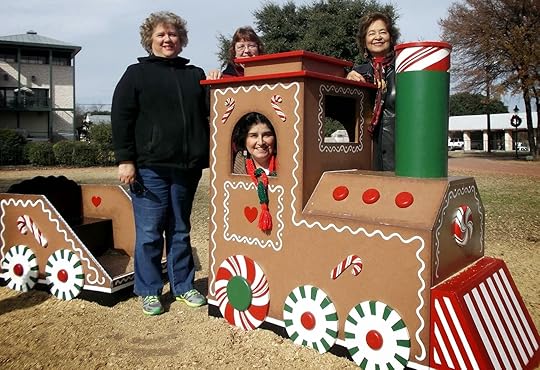 Our group after last December's critique/Christmas lunch in Fredericksburg, Texas
Our group after last December's critique/Christmas lunch in Fredericksburg, Texas Being a fiction writer is a strange and wonderful thing. Your head is full of characters in various stages of evolution, all clamoring for you to tell THEIR story! To a non-writer it must seem a form of madness, and so naturally, fiction writers are drawn to one another to share this madness.
When you write a rough draft, the words pour directly from your heart in all their unpolished glory. Reading these awkward nuggets gives a glimpse into the writer’s soul. Being able to offer and receive honest feedback from one another not only polishes prose into a saleable diamond but strengthens the personal relationship between the writers.
I first met Diane about 15 years ago (note: now 24!) through the San Antonio Writers Guild. We were both young mothers and teachers with an insatiable need to write. We began publishing about the same time—Diane in the book market and me in magazines and anthologies. At first I was a little in awe of her—I was still insecure about my abilities and she seemed so confident and vivacious. However, through our exchanges in a small critique group, I came to know her as a generous friend.
For example, about two years ago we were both invited to participate in a book fair at San Antonio College where the authors were assigned tables under a large tent so people could buy their books. Diane asked the organizers if she and I could share a table. I was especially glad because in my experience it has been difficult for me to sell books without the benefit of my presentation, since my name is not a household word.
I learned a lot from Diane that day. She cheerfully hawked her many books with bubbling enthusiasm. She always encouraged people to check out my book, too! By the end of the day most of her stacks had disappeared. I wouldn’t have sold any if it weren’t for her sales pitch!
Another more poignant example of Diane’s generosity happened this spring when I had to undergo chemotherapy and missed several months of our critique group. She not only emailed me on almost a daily basis but took time from her busy schedule to write me real letters filled with day-to-day happenings just like a “chat over coffee” to help me feel connected to the outside world. She also sent me pages to critique which helped me feel like I was still a valuable member of our writers’ group. She sent me a copy of her latest book, Upside Down and Backwards, which our group had critiqued. Words are not adequate to describe how much those gestures meant to me during that desperate time.
Diane and I have often bemoaned the frustration of breaking in with the big houses in New York. But I am so thankful that Arte Publico Press and the people of San Antonio recognize Diane’s talent and her valuable contribution to children’s literature. Someday New York will figure out what we have known for years: that Diane’s books tell the story of familia in a way that touches the heart, just as her life has touched mine and that of so many others.
To paraphrase the last line in E. B. White’s Charlotte’s Web, “It is not often that someone comes along who is a true friend and a good writer.” Diane is both.
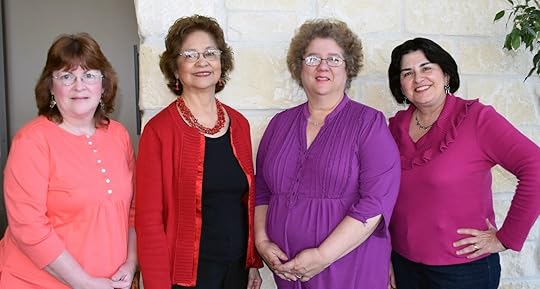 Two weeks ago at the Boerne, Texas library--Diane on rightOur critique group (all writers for children, from picture books through YA) has changed over the years as writers have come and gone (and Jan was the second one to die--I wish I'd thought to get a photo while she was with our group), but Diane and I keep going and going, as long as we have stories to share.
Two weeks ago at the Boerne, Texas library--Diane on rightOur critique group (all writers for children, from picture books through YA) has changed over the years as writers have come and gone (and Jan was the second one to die--I wish I'd thought to get a photo while she was with our group), but Diane and I keep going and going, as long as we have stories to share.
Published on March 24, 2014 15:12
March 14, 2014
Parenting Humble Pie
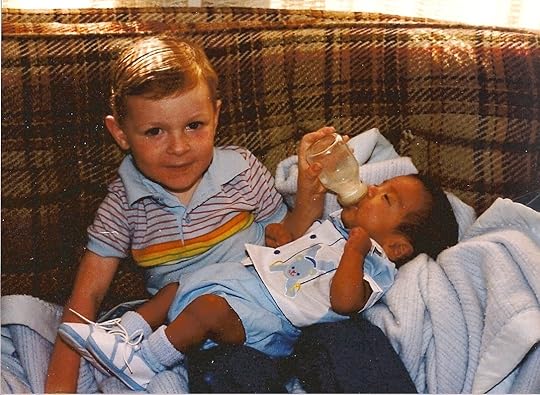 With his foster brother, ManuelAs foster parents, my husband and I were required to attend ongoing training sessions to better equip us to deal with different situations. One lecture was entitled, "The Three Different Types of Children." As the instructor discussed the first category--the "easygoing child," I glanced down at our six-year-old foster daughter, who was quietly coloring beside me. I realized that although she had multiple issues stemming from her dysfunctional family, most of the time her behavior could be classified as "easygoing." Next came the "slow learner," which I felt sure the six-month-old in my lap would be labeled someday. He had been born two months premature. When he came to us he was four months old, on a heart monitor, and only weighed eight pounds. Even after two months of care and regular feeding, in size and development he was more like a typical two-month-old. Finally the instructor said, "And the third type is known as the difficult child." At that moment our own four-year-old son chose to throw a very loud tantrum. My embarrassed husband carried him, kicking and screaming, out of the room. "And that," said the instructor without missing a beat, "is a very fine example of a difficult child."
With his foster brother, ManuelAs foster parents, my husband and I were required to attend ongoing training sessions to better equip us to deal with different situations. One lecture was entitled, "The Three Different Types of Children." As the instructor discussed the first category--the "easygoing child," I glanced down at our six-year-old foster daughter, who was quietly coloring beside me. I realized that although she had multiple issues stemming from her dysfunctional family, most of the time her behavior could be classified as "easygoing." Next came the "slow learner," which I felt sure the six-month-old in my lap would be labeled someday. He had been born two months premature. When he came to us he was four months old, on a heart monitor, and only weighed eight pounds. Even after two months of care and regular feeding, in size and development he was more like a typical two-month-old. Finally the instructor said, "And the third type is known as the difficult child." At that moment our own four-year-old son chose to throw a very loud tantrum. My embarrassed husband carried him, kicking and screaming, out of the room. "And that," said the instructor without missing a beat, "is a very fine example of a difficult child."
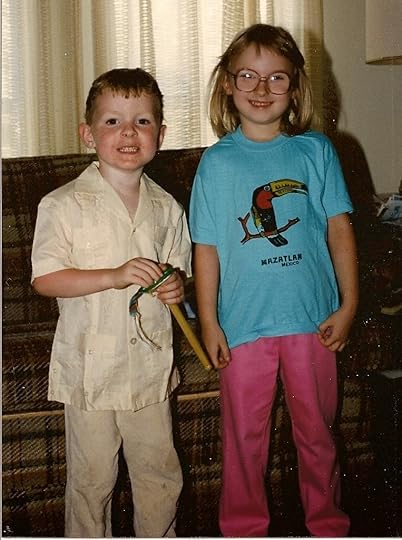 With his foster sister, MandiP.S. In hindsight, I'm thankful our son was so strong-willed. It was a huge challenge when he was small, but it has made him the strong and capable man he is today.
With his foster sister, MandiP.S. In hindsight, I'm thankful our son was so strong-willed. It was a huge challenge when he was small, but it has made him the strong and capable man he is today.
Published on March 14, 2014 06:18
March 5, 2014
Lessons from my children: Growing pains
 He was exceptionally, scarily smart.
He was exceptionally, scarily smart.I don’t suppose anyone is ever truly prepared to become a parent. During my first pregnancy I spent a lot of time talking to my unborn child and feeling (overly) confident that things were going to be just swell. Boy, was I in for a surprise! Colic, sleepless nights, “projectile vomiting,” a one-month-old hospitalized for pneumonia, "purple fits" (screaming so hard he would turn purple and nearly pass out), strong-willed “terrible two’s” that began at fourteen months and lasted for several years, biting other children, “expelled” from three babysitters, hyperactive, ADD, broken bones, stitches, etc. This boy was challenge with a capital C.
 Mr. Personality had 2 speeds: High and Off (asleep)
Mr. Personality had 2 speeds: High and Off (asleep)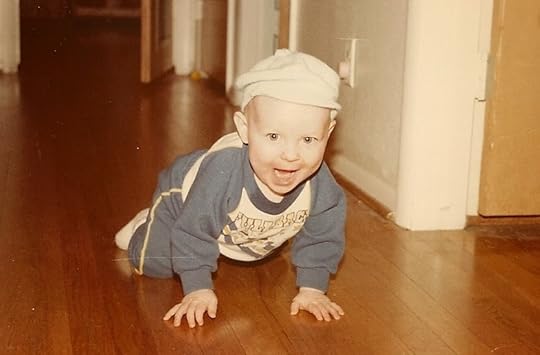 "Catch me if you can!"The more trying he became, however, the more I realized that being a mother was a tremendous opportunity to grow in my relationship with my heavenly Father. It’s humbling, to say the least, to be forced to see yourself as you really are through the words and actions of your children. Parenting, like studying the word of God, can be a beneficial mirror to help us examine ourselves (II Corinthians 13:5) as we grow in faith and (hopefully) wisdom.
"Catch me if you can!"The more trying he became, however, the more I realized that being a mother was a tremendous opportunity to grow in my relationship with my heavenly Father. It’s humbling, to say the least, to be forced to see yourself as you really are through the words and actions of your children. Parenting, like studying the word of God, can be a beneficial mirror to help us examine ourselves (II Corinthians 13:5) as we grow in faith and (hopefully) wisdom.  With our dog, B.J.
With our dog, B.J.As exasperated and disappointed as we become with our children’s disobedience, imagine how the Father must feel when we willfully sin or neglect to serve Him or choose the pleasures of this life over the trials of the strait and narrow way. The reward for choosing the way that leads to life is not visible with the eyes, nor does it come immediately. We, like children, sometimes focus on instant gratification rather than patiently wait for the expectation of our hope--eternal life.
 "I put it on myself!"
"I put it on myself!"
 Blowing bubbles (bruise on forehead from running full throttle and falling on his head)
Blowing bubbles (bruise on forehead from running full throttle and falling on his head)So as my children grew to maturity, I experienced growing pains right along with them--sometimes in ways I never dreamed possible. With our heavenly Father, however, all things are possible, even bringing one headstrong mother and her hard-headed child under submission to Him in all things!
 Look, Olivia, your Daddy loved books, too!
Look, Olivia, your Daddy loved books, too!
 There were days...but I wouldn't trade the memories now.
There were days...but I wouldn't trade the memories now.
Published on March 05, 2014 12:41
March 3, 2014
Lessons from my children: Great Expectations
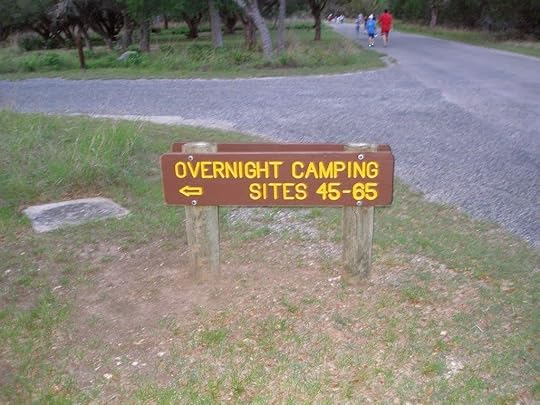 When my youngest son, Robert, was six or seven years old, he and I had the opportunity to travel to Houston with my oldest son, my husband, and their Boy Scout troop to visit the Johnson Space Center and the Museum of Natural History (which included a one hour “Mission to Mars”). Since I grew up during the heyday of the space program and wanted to be the first lady astronaut (even though I get sick on carnival rides), I was anxious to go. I didn’t find out until AFTER we’d paid that the deal included camping with the troop on Friday night at a “primitive” campsite.
When my youngest son, Robert, was six or seven years old, he and I had the opportunity to travel to Houston with my oldest son, my husband, and their Boy Scout troop to visit the Johnson Space Center and the Museum of Natural History (which included a one hour “Mission to Mars”). Since I grew up during the heyday of the space program and wanted to be the first lady astronaut (even though I get sick on carnival rides), I was anxious to go. I didn’t find out until AFTER we’d paid that the deal included camping with the troop on Friday night at a “primitive” campsite.
 I’d never ever been camping, not once, but I had no preconceived ideas about the glory of it. Not so Robert; he was THRILLED about his first campout with the "big guys." The five hour trip to Houston sandwiched between two hyper scouts didn’t bother him. Waiting an hour for the rest of the troop to show up didn’t bother him—he was too excited about the prospect of a REAL campout.
I’d never ever been camping, not once, but I had no preconceived ideas about the glory of it. Not so Robert; he was THRILLED about his first campout with the "big guys." The five hour trip to Houston sandwiched between two hyper scouts didn’t bother him. Waiting an hour for the rest of the troop to show up didn’t bother him—he was too excited about the prospect of a REAL campout.When we finally reached the campsite, it was HOT, it was MUDDY, it was ALMOST DARK, there were MOSQUITOS the size of sparrows, and I just wanted to go to sleep. My husband expertly set up the three man tent, and Robert and I “got ready” to go to sleep. As soon as we crawled into the airless tent, Robert looked at me. “This is camping out?” he asked. “Yep, this is camping out,” I sagely replied.
 We tried to find a comfortable position in the stifling heat. The scouts were making about as much noise as twelve boys can make. This lasted for at least three hours. Once they settled down, a group of (obviously) drunk young people who were camped not too far away turned up their music to full volume, drowning out the bullfrogs in the nearby pond.
We tried to find a comfortable position in the stifling heat. The scouts were making about as much noise as twelve boys can make. This lasted for at least three hours. Once they settled down, a group of (obviously) drunk young people who were camped not too far away turned up their music to full volume, drowning out the bullfrogs in the nearby pond.Robert looked at me again. Sweat rolled down his face. “Camping out is not much fun. I thought it would be fun.”
I patted his hand, and he managed to fall asleep from sheer exhaustion. I dozed off and apparently rolled onto my side too close to the tent. I was awakened by the sudden presence of a weight on my face. A BULLFROG had jumped onto the thin tent where my face happened to be! (I'm proud of myself—I did NOT scream.)
I hadn’t expected camping to be any different from what I experienced (except the frog part), but poor Robert’s “great expectations,” born in his fertile imagination, were utterly dashed.
Aren’t you glad our great expectations of heaven will never disappoint us? Our finite minds can’t even begin to imagine the glory that awaits the faithful--eternity in the presence of Almighty God!
I think I can safely say that no frogs will jump on our faces there.

Published on March 03, 2014 13:09
February 28, 2014
Why I Write
 L to R: a gift from my husband, his bear as a child, and "Sally" who was our son's bearMy earliest memories come from a several week hospital stay at age 3 when I almost lost my right eye due to a pernicious virus I've lived with ever since (and had two cornea transplants because of it). I vividly remember when the nurses would remove the pressure patches on my eyes and I could see the yellow walls and the rails on the bed. I still remember feeling indignant that I was in a "crib" because after all I wasn't a baby any more. Because of this virus I missed a lot of school, and because my Dad was in the Army we moved often. Since I was very shy, it was difficult to make friends under these circumstances, and so books became my best friends. Within the pages of a story I could lose myself, forget about my own problems, and share an adventure with my new friends. In the third grade Charlotte's Web became my new favorite (my original hardback pictured above--inside the torn book jacket the price is $3.50). I cried when Charlotte died, every time I read it, even though I knew it was coming. Why, I wondered, did I cry about a fictional spider in a story? What magic was at work here? That story magic inspired me to write my own stories, to discover why and (most importantly) how an author can make that connection to a reader. Finally, after many years and at least two million written words I am beginning to understand. The characters must be real to the author before they can ever become real to the reader. Inside my head live many, many characters. Some are fully grown and as real to me (or more real) than flesh-and-blood people I interact with every day. Some are in the pondering process, as I get to know them better. Some are only vague shadows and may or may not reveal themselves. But the reason why I HAVE to write, a process as vital to my emotional health as breathing, eating, sleeping, is because all these characters press against my psyche every day, imploring me to "tell their stories." I hear their voices and feel compelled to write down what they say. It doesn't matter if anyone else ever reads the stories, I must write them down because they are my stories to tell. Thankfully I actually love the process of writing. Perhaps those authors we read about who turn to drugs and alcohol don't really love their characters or writing about them and are trying to "drown out" the voices. That's very sad. I am so grateful for this outlet of expression, since being shy I have always had trouble talking about what's going on inside. It's much, much easier for me to listen to other people's troubles. Hmm, maybe I'm a good listener because I've had a lifetime of listening to my fictional friends. Now that's a happy thought! Why do you write?
L to R: a gift from my husband, his bear as a child, and "Sally" who was our son's bearMy earliest memories come from a several week hospital stay at age 3 when I almost lost my right eye due to a pernicious virus I've lived with ever since (and had two cornea transplants because of it). I vividly remember when the nurses would remove the pressure patches on my eyes and I could see the yellow walls and the rails on the bed. I still remember feeling indignant that I was in a "crib" because after all I wasn't a baby any more. Because of this virus I missed a lot of school, and because my Dad was in the Army we moved often. Since I was very shy, it was difficult to make friends under these circumstances, and so books became my best friends. Within the pages of a story I could lose myself, forget about my own problems, and share an adventure with my new friends. In the third grade Charlotte's Web became my new favorite (my original hardback pictured above--inside the torn book jacket the price is $3.50). I cried when Charlotte died, every time I read it, even though I knew it was coming. Why, I wondered, did I cry about a fictional spider in a story? What magic was at work here? That story magic inspired me to write my own stories, to discover why and (most importantly) how an author can make that connection to a reader. Finally, after many years and at least two million written words I am beginning to understand. The characters must be real to the author before they can ever become real to the reader. Inside my head live many, many characters. Some are fully grown and as real to me (or more real) than flesh-and-blood people I interact with every day. Some are in the pondering process, as I get to know them better. Some are only vague shadows and may or may not reveal themselves. But the reason why I HAVE to write, a process as vital to my emotional health as breathing, eating, sleeping, is because all these characters press against my psyche every day, imploring me to "tell their stories." I hear their voices and feel compelled to write down what they say. It doesn't matter if anyone else ever reads the stories, I must write them down because they are my stories to tell. Thankfully I actually love the process of writing. Perhaps those authors we read about who turn to drugs and alcohol don't really love their characters or writing about them and are trying to "drown out" the voices. That's very sad. I am so grateful for this outlet of expression, since being shy I have always had trouble talking about what's going on inside. It's much, much easier for me to listen to other people's troubles. Hmm, maybe I'm a good listener because I've had a lifetime of listening to my fictional friends. Now that's a happy thought! Why do you write?
Published on February 28, 2014 07:16



